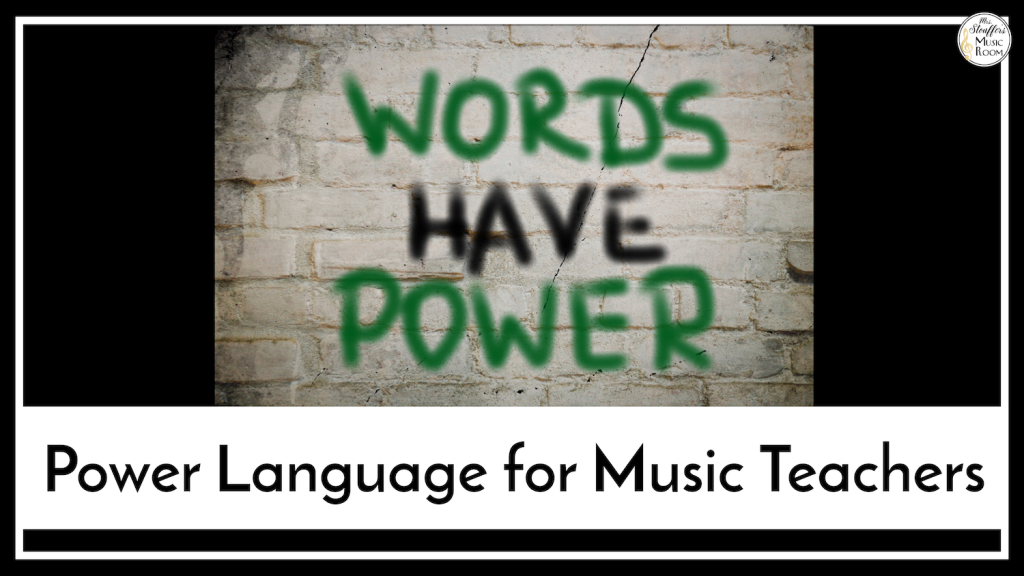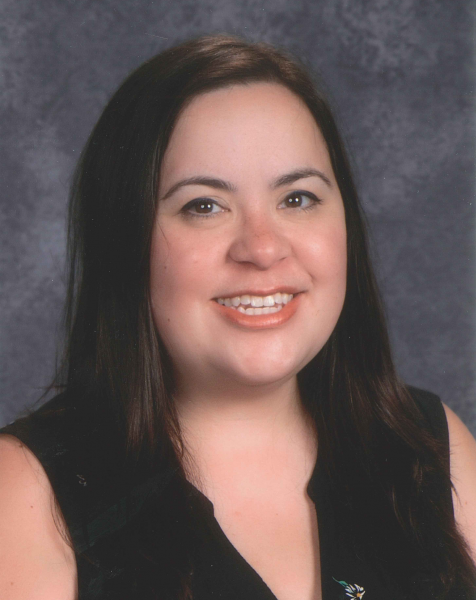Hey and welcome to 2022! I hope this year holds more healing, more self-care, and good things for all of you. To start out the year, I thought a look at power language for music teachers would be a great place to start. Too many times, specials teachers get put on the back burner, treated like second class teachers, or have our impact minimized.

I know a lot of people do a word of the year, and the word I was given this year is “Glide” (move with a smooth continuous motion, typically with little noise. Source: Google.). I think this is PERFECT. I think I need a little less noise and a little more continuous motion. I think that taking a stand for ourselves is a perfect way to introduce my word into our lives.
If you are looking to find your own word of the year, I suggest this Word of the Year Generator which is where I got “Glide” as my word.
Note: Sorry to my male identifying readers, but some of these are directed at women since teaching is a female dominated field. But keep reading, some are definitely for you too!
1. Bye Bye “Just”
“Just” is a qualifier. I see it on lists of words that women use more than men. It implies asking for permission. I “just” need to do this first. I “just” need money for a few supplies. I “just” need to have some prep time. I “just” need to be treated the same as other teachers in my building.
I need to do this first. I need money for a few supplies. I need to have some prep time. I need to be treated the same as other teachers in my building.
This goes for other qualifiers too. These can be things like “I kind of feel like/I feel like”, “I might not be right but”, or other things that state your opinion rather than a cold hard fact.
2. Be a “Mean” Girl
I’m not saying be a Plastic or insist that your bestie can’t wear their awesome hoops, but mean does not equal assertive. Lots of assertive women are labeled as “aggressive”. Check out this article from Forbes. It is absolutely alright, and encouraged, to make your needs known. Assert yourself. Stand up for yourself when someone makes a crack about the way the kids sounded at their last concert. Do they have lots of experience teaching kids’ voices/instruments and know what is developmentally appropriate? Probably not and it’s ok to put them in their place. Don’t let yourself get walked over by someone else in your building who doesn’t have the qualifications you do.
3. Advocate
For your students, for yourself, for your program. If you don’t verbalize what you need, your admin isn’t a mind reader. Tell them what you need. Are you struggling to legally get enough music for your kids with your budget, they need to know that. If you are completely unable to go from 8:00am – lunch to 3:00 pm without more than a moment to use the restroom or reset materials because your prep is at the end or the beginning of the day, you need to verbalize it. If your schedule has K back to back with 5 and you can’t possibly set up for them correctly with 1 minute passing time, you need to let your admin know. By communicating the issue, your admin can help. If you suffer in silence, no one is able to help. Even if the change can’t come this year.
4. “No.” is a complete sentence.
No. Nope. Nay. Nah. Can’t. Nyeht. Nein. Non. Nej. 不是. رقم. Dili. Ne. Tidak. A’ole. Nem.
You get the picture. Someone asking you to teach the students how to count to 10 with a new song because it’s not sticking in class? No, we have a curriculum to cover in Kindergarten music. Someone ask for a performance for parents next week. No, that isn’t enough time.
I’m not saying to give your colleague a litany of “no” and then turn around. Inform why it’s not possible. Don’t take on things that aren’t your curriculum. Don’t say yes to an impossible situation that your students are going to be stressed about. This is advocating for you and your program besides valuing yourself and your time.
5. Take a cue from the stage
Verbalizing accomplishments is a good thing. If your students finally nailed the new concept, playing recorder without overblowing, or blending their vowels, tell their classroom teacher. Tell the admin. Send a note home. It is totally acceptable to “take a bow”. If someone compliments your students’ work, or yours, say thank you and don’t qualify it with anything else. Let people praise you. And then turn around and tell your students. If they aren’t praising the amazing things your students are doing, inform them what they are missing.
6. Students Not Kids
This one is hard for me and I’ve talked about it before on my Podcast. When you have students for 6 years or more, it can be easy to call them your “kids”. But they aren’t your kids. It CAN (not always) be a way to guilt teachers into doing more. “It’s for your kids.” We all know that if push came to shove, we’d stand in front of our students in a situation. We’d put ourselves in front of them to protect them. We watch them grow, we celebrate successes with them, and sometimes we watch them struggle. But they aren’t our family. It also opens the door for things like favoritism, and toxic teacher talk about students that don’t fit the mold because “why can’t they be like so and so.” It also emotionally attaches you to a job. Guilt for not giving more. Guilt for not staying hours late every day. Guilt for not making that extra piece of scenery or laminating cute cards when you could have written them out quickly and made a copy. Guilt when you know it’s time to step away.
If you want to call your students “your kids”, I totally get it. There are people that will always be my kids. But I’m not sure I will ever call my students “my kids” from here on out.
Take back your power.







Love your list, and especially your word for the year. Mine is release. Release things I don’t need to carry anymore, and release like the kinetic energy as an arrow leaves a bow. I’ve also worked hard to weed “kids” out of my vocabulary.
I love that word! And yes – it is a really hard word to let go of.
Excellent. Way to go, Mrs. Stouffer. She’s right, everybody.
Thanks <3
I found out that my word is “awe”
So I’ll need to see where I’m going to go with this word.
Right now I’m not in “awe” with doing music reports the way I’ve been told to do them… 😳
Great word! How did the report go?